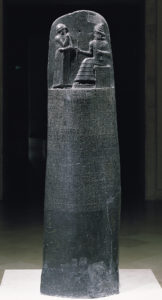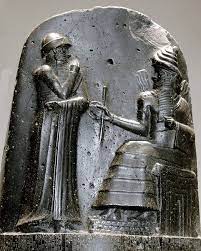If a man destroys the eye of another man, they shall destroy his eye.
– Hammurabi’s Code

Stele bearing Hammuabi’s Code
Hammurabi: a semi-mythical king of Babylon (a city-state in present-day Iraq) who handed down the first code of written laws more than 1,700 years before the birth of Christ. Hammurabi, the law-giver. Hammurabi, one tough bastard.
Let’s face it, anyone who has ever been pulled over by a cop or spent a day in court (even if it’s just traffic court) knows the open secret surrounding laws: those who make and enforce them are frequently bastards.
Under Hammurabi’s code, fathers exercised enormous power within their immediate families. Fathers named their daughters’ dowry price, and kept the money to use as they saw fit. Sons who struck their fathers for any reason had their hands cut off. Wives had some protection. If a husband tired of his wife, he could set her aside, as long as he gave her the price of the house he’d just turned her out of.
It’s easy to forget that someone, somewhere, came up with the notion not just of justice, but of punishment. And while Hammurabi certainly wasn’t the first guy to mete out swift and terrible retribution for crimes real or imaginary, he was certainly the first one to make sure the rules of punishment got written down. In so doing, he intentionally codified quite a ledger of laws intended to protect both life and property. Unintentionally, he also preserved evidence of a fiendish imagination able to (with apologies to Shakespeare) “devise brave punishments” for the guilty.
The “eye-for-an-eye” punishment quoted above is a decidedly harsh penalty for an admittedly heinous crime, but “eye-for-an-eye” is a day at the beach compared to other rules laid down by Hammurabi in his code, including the notorious “trial by ordeal,” wherein people suspected of a crime underwent torture to assess their guilt or innocence. In one example, thieves were expected to lick a red-hot spoon, and then their tongues were checked to see whether they had blistered. If the blister burst when pressed by the judge with a finger, then they were guilty, if not, innocent, which cold comfort when facing the possibility of having your taste buds singed off.

Hammurabi’s Code is rife with examples of this form of “jurisprudence.” For example, if a woman who sells wine in her establishment (and it clearly states that this applies solely to women) is charged with inflating the price of her drinks, “she shall be convicted and thrown into the water,” meaning that the Euphrates River would be her final judge: if the woman floated, she was deemed innocent, if she sank, she was found guilty. Never mind whether or not the woman in question knew how to swim. Most people in the ancient Near East didn’t! Another portion of the code that gave the Euphrates the final say stated that if a woman “leaves her husband, and ruins her house, neglecting her husband, this woman shall be cast into the water,” and we all know how that turns out.
The code didn’t require the Euphrates to mete out all ultimate penalties. Other methods were used as well: “if a ‘sister of a god’[nun] opens a tavern, or enters a tavern to drink, then shall this woman be burned to death.”
What sort of bastard dreams up punishments such as these? Hammurabi of Babylon, that’s who!

Hammurabi (standing, left) covering his mouth in the presence of the sun god Shamash, so that his breath will not taint the god’s air.
